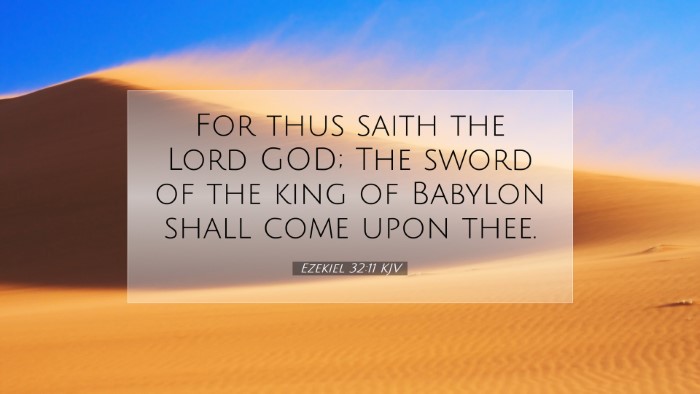Ezekiel 32:11 Commentary
Verse Context: Ezekiel 32:11 states, "For thus saith the Lord God; The sword of the king of Babylon shall come upon thee." This verse is part of a larger prophecy concerning the judgment of Egypt and its downfall at the hands of Babylon.
Overview of Ezekiel's Prophecies
The book of Ezekiel is renowned for its vivid imagery and profound theological themes. As a prophet during Israel's exile in Babylon, Ezekiel's messages encapsulate God's judgment against Israel and her neighbors. This particular chapter focuses on Egypt's impending doom, highlighting the sovereign will of God in orchestrating historical events.
Insights from Commentators
Matthew Henry's Commentary
Matthew Henry emphasizes the authority of the proclamation made through Ezekiel. He points out that while Egypt was once a great power, her judgment signifies that no nation can stand against God's sovereign plan. Henry notes the symbolism of the "sword of the king of Babylon," representing divine judgment. God's instrument of judgment (Babylon) serves as a reminder that He controls the rise and fall of kingdoms.
Albert Barnes' Notes
Albert Barnes provides a detailed analysis of the phrase, “the sword of the king of Babylon.” He interprets this as both a literal and spiritual weapon of God’s judgment. Barnes emphasizes that the prophecy illustrates the consequences of Egypt’s pride and reliance on her own strength. He warns that nations should heed the warning given through Ezekiel, as reliance on worldly power will ultimately bring about destruction. He also notes that the historical context reveals Babylon as the vehicle through which God's will is executed.
Adam Clarke's Commentary
Adam Clarke, in his interpretation, reflects on the stark reality of judgment delivered by God. He mentions that this prophecy serves to remind the Israelites in captivity that God remains sovereign even when their circumstances seem dire. Clarke further explains that the impending invasion by Babylon illustrates the broader theme of God's justice, which cannot be escaped. In his view, Clarke presents the prophecy as not only concerning Egypt's fate but also as a cautionary tale for all nations, asserting that divine retribution is inevitable.
Theological Reflections
- Sovereignty of God: The verse underlines God’s ultimate authority over nations and history. The execution of judgment through Babylon exemplifies God's governance.
- The Nature of Judgment: The sword represents God's decision-making in punishing sin and arrogance, reminding us that divine judgment is certain.
- Lessons for Today: Just as Egypt faced consequences, modern nations and individuals must acknowledge God’s sovereignty over their lives and societies.
Practical Application
For pastors, students, and theologians, Ezekiel 32:11 serves as a poignant reminder of God's righteousness and the serious nature of His warnings. As one meditates on this scripture, consider the following:
- Preaching:** How can this text be a foundation for messages on accountability to God’s sovereignty?
- Study:** Engage in deeper reflection on the implications of national pride versus humble reliance on God.
- Personal Reflection:** Encourage self-examination regarding one's own reliance on earthly power instead of divine providence.
Conclusion
The phrase "the sword of the king of Babylon shall come upon thee" is not merely a historical claim but a profound theological statement about the nature of God's justice and sovereignty. Through the insights of Matthews Henry, Albert Barnes, and Adam Clarke, we are reminded that God's ultimate plan prevails and that each generation must heed the lessons of those who have come before. As we explore this verse, may it compel us to recognize our own vulnerabilities and reaffirm our dependence on God.


